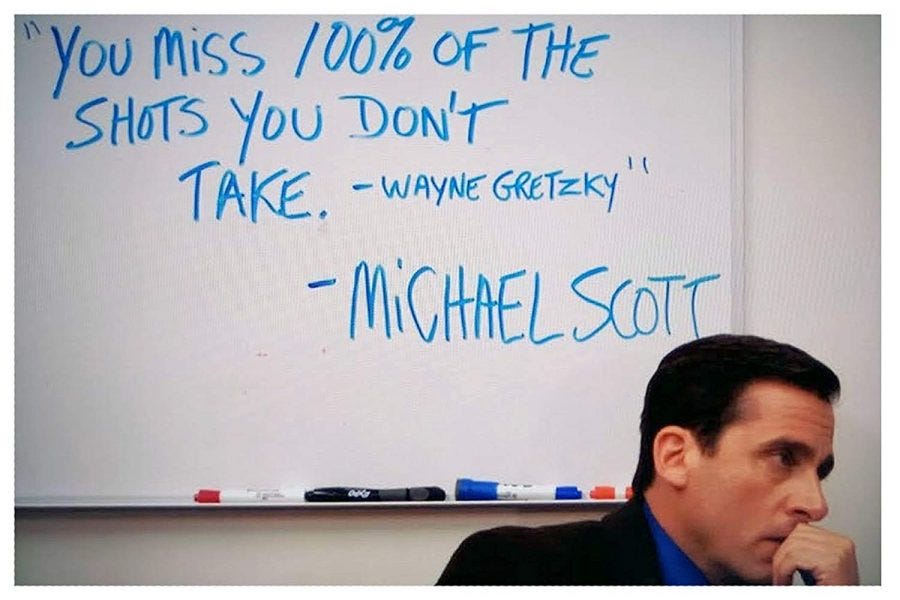What could go right?
On the anticipation of failure and what we can do about it.
I like making lists. In particular I’m a big fan of making “pros and cons” lists. Especially whenever I’m faced with taking an action that’s outside of my comfort zone. This week, I think I figured out the reason: without the deliberate action of writing down the “pros”, I default to emphasising the “cons”.
I have often seen this at work and in my coaching conversations:
“I want to be in xyz position, but I’m hesitant to [tell my manager / apply to new jobs].”
“I want to apply for a new role but [I don’t hit all the requirements and might get rejected / I might not like the job if I do take it]."
“I want to start a side project, but I don’t know if [I have the time and energy to complete it / it will be successful / people will think it’s stupid].”
“I want to speak up and share my ideas, but people [might not agree / might dislike me for it].”
I’ve just started reading “Think Big” and a section at the start resonated with me on this point. In the book, behavioural scientist Dr. Grace Lordan explains that this is a very common cognitive bias. We are excellent at putting far too much weight on the cost of failure or rejection, rather than the potential reward of success.
Even the anticipation of failure is so awful that we don’t want to go anywhere near it. But anticipation is not the real thing, and the real thing is rarely that bad.
We overestimate the pain of failure and underestimate the cost of regret.
Not that many things are actually life or death. Failing a job interview is probably not that bad. Starting a passion project which then gets absolutely zero traction is very survivable. You will probably learn from both experiences, though.
There is a coping method for dealing with decision-based-anxiety where you are encouraged to lean into the worst case scenario and actually come to terms with it. Think of the worst possible outcome, make a plan around it, and then be okay with that thing happening, even if it is incredibly unlikely. This is literally “What could go wrong?” taken to the extreme. By finding the worst possible thing that could go wrong and being okay with it, you now have nothing to worry about. No matter what happens, you have a plan for it and you can deal with it.
I would like to add an addendum to this technique — also do the exact opposite.
Ask yourself “what could go right?”
List the absolute best things that could happen. The most exciting, thrilling things you could get out of that project you want to start. The best perks for the job you want to apply for. The connections you will make by sharing something. Give as much weight (if not more) to the exciting things that could happen if you give it a shot.
I’m now realising this weeks article can be summarised by a classic joke from The Office:

This has also been on my mind because I did two things I found scary this week:
I scheduled the first two interviews for the Roads Untaken podcast.
I shared my first article on management on LinkedIn and launched a secondary newsletter focused on this topic, the goal being to build up a backlog of articles with actionable advice specific to engineering managers and software engineers, both from myself and guest writers. (If you want to write a guest post, please reach out.)
Another realisation for me is that most of the time, when I find myself focusing on the “cons” I am also overemphasising things that aren’t in my control, rather than focusing on what is. If you look back at the examples I listed at the start of this article you’ll realise it’s the same for all of those, too (“I might get rejected” / “people might not like my work” / “people might disagree”).
Instead of catastrophising, put your energy into what you can control. That includes learning from “failures” along the way and taking any lessons that you can onboard. When you frame it like that, you begin to see failure for the myth that it is, and instead put a little more emphasis on what could be.
See you next week.
-Mike.
✍️ Quote of the Week
The average human lifespan is absurdly, terrifyingly, insultingly short. But that isn’t a reason for unremitting despair, or for living in an anxiety-fueled panic about making the most of your limited time. It’s a cause for relief. You get to give up on something that was always impossible—the quest to become the optimized, infinitely capable, emotionally invincible, fully independent person you’re officially supposed to be. Then you get to roll up your sleeves and start work on what’s gloriously possible instead.
― Oliver Burkeman, Four Thousand Weeks: Time Management for Mortals
🏆 Highlights around the web this week
🗞 Article: “On Sabbatical” - an article from Vinamrata Singal on fulfilment, burnout, and taking a sabbatical from corporate product.
📚 Book: Think Big by Dr. Grace Lordan. This is the book I mentioned in this weeks article. I’m about 20% in which is very early to recommend a book, but I’m really enjoying it. Highly recommended if you’re interested in behavioural-science-backed tips on how to think about yourself, your life goals, and how to figure out what you want.
🍿 Series: Taskmaster is back for Series 16 and the episodes are available on YouTube one day after they’re released in the UK, which is amazing news if you’re a fan outside the UK like me and don’t have to resort to other means to watch it. I’m such a big fan that I had to include it here even if it’s completely unrelated to any of my usual content.


